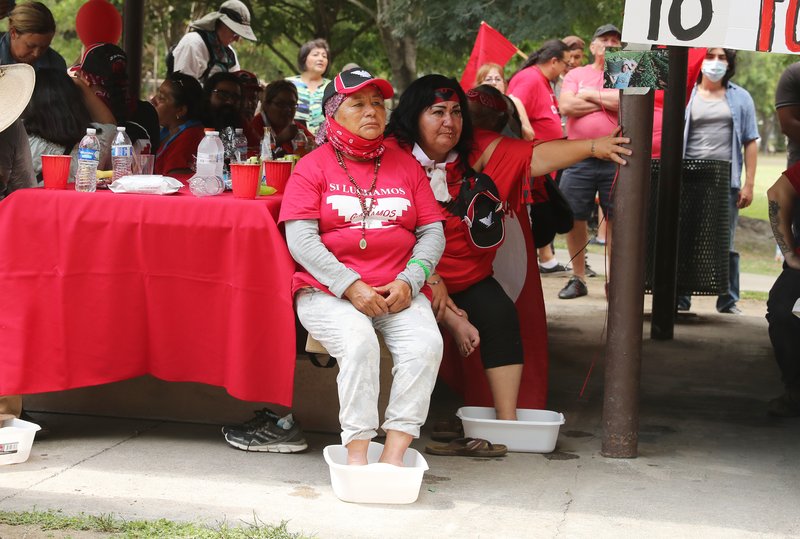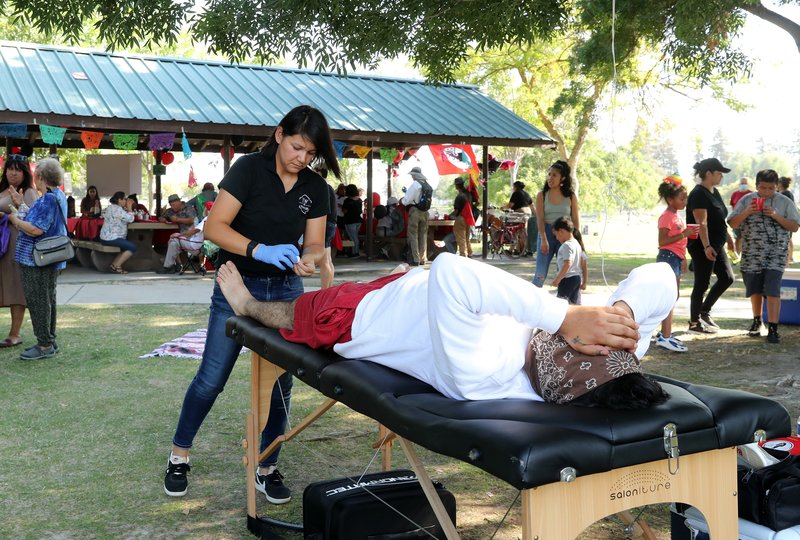Jesus Garcia sat on the grass at Donnelly Park on Wednesday, taking far longer to remove his socks than he normally might.
The Bakersfield resident had just finished a 15-mile march from Livingston, part of the United Farm Workers’ quest to gain awareness for Assembly Bill 2183 — the California Agricultural Labor Relations Voting Choice Act. The bill would help decide how farmworkers are allowed to cast votes in union elections, and is virtually the same bill that Gov. Gavin Newsom vetoed last September.

The sticky conditions created by the 100-degree heat and overcast skies made it was next to impossible for Garcia to remove his sweat-soaked compression socks. When he did manage to remove them, a grape-sized blister on his big toe was revealed.
“This is nothing compared to what farmworkers have to deal with every single day,” said Garcia, who used to be a runner in his youth. “But I should’ve double-socked.”
The UFW wants to put as much public pressure on the governor as possible, and this march, which started Aug. 3 in Delano, will continue to the steps of the Capitol in Sacramento.

While the marchers sought water, food and shade following their march up Highway 99, some 200 supporters were on hand to help them recover.
The events took on the appearance of a “fiesta,” with “papel picado” strung from the pergolas in the park and signs that read, “Si Se Puede” (roughly, “Yes we can”), the slogan made popular by Cesar Chavez and his team during the farmworker strikes of the 1960s.
Susy Delgado, owner of KW Recovery Lab in Turlock, was on hand with staff to help with muscle recovery and blister care.
“It was absolutely our pleasure to be able to provide a little pick-me-up to the marchers,” said Delgado. “We got called back to provide more care while they finish this next week and we will help in any way we can.”
Stanislaus State women’s soccer coach Gabe Bolton had his team at Donnelly Park to assist.

“We have a social justice group on our team,” said Bolton. “We started seeing posts about the bill and the UFW marching; and I’ve learned and the team has learned what the purpose of the march is and how we can support the farmworkers in our community and throughout the state.”
Alexia Estrada, a senior on the soccer team and political science major, didn’t participate in the march but wanted to show her support.
“Our mission is to educate our teammates, and ourselves, really, about social-justice issues here in Turlock and in California.”
According to march director Eriberto Fernandez, a deputy director of governmental affairs for the UFW Foundation, some legs of the march have attracted as many as 200 marchers. About 70 marchers made the journey to Turlock on Day 15 of the 24-day march. The following day, marchers departed Donnelly Park for the Red Events Center in Modesto, some 13 and a half miles away.
“This march says, ‘We’re resilient’,” said Fernandez, who pointed out that AB 2183 is identical to the bill vetoed by Newsom.
Political science professor Dr. Dave Colnic, president of the CSUS chapter of the California Faculty Association, didn’t care to make a prediction as to the fate of AB 2183, but did point out that the ag industry is a colossus in California politics.
“If we continue to put pressure on the governor, he will come around, but that requires real pressure. And this march helps.”
Llewellyn Boyle, president of the Stanislaus County chapter of retired California Teachers Association members, echoed those sentiments.
“The more pressure and the more numbers we bring to bear on Gov. Newsom, the more likely he’ll see things in a positive fashion for the farmworker community and the UFW in particular,” said Boyle, who was dishing up food provided buy La Morenita restaurant in Turlock.
According to farmworkerfamily.org, between one-third and one-half — between 500,000 and 800,000 — of farmworkers in the United States reside in California.
There are approximately 7,000 UFW members in California, according to Elizabeth Strater, UFW’s director of strategic campaigns.
Turlock resident Melanie Berru, a professor of sociology at Modesto Junior College, felt it was her responsibility to come out and offer support.
“Four marchers are staying in my house tonight,” said Berru, who lives in the very same house on Farr Street once occupied by her farmworker grandparents. “This is really a full-circle moment. When my grandparents could no longer work in the fields, they housed Braceros. My grandmother would feed them and my grandfather would transport them to the fields.
“Now it’s our turn. It’s our responsibility. And it’s our honor.”






